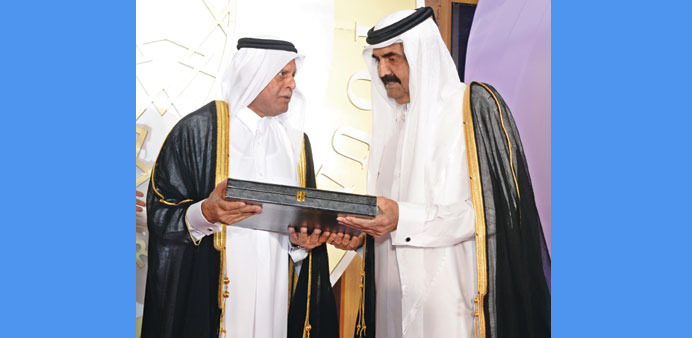HH the Father Emir Sheikh Hamad bin Khalifa al-Thani launches the inaugural industry report produced by The Abdullah Bin Hamad Al Attiyah Foundation for Energy and Sustainable Development. PICTURES: Thajuddin
By Pratap John/Chief Business Reporter
HE Abdullah bin Hamad al-Attiyah has said higher oil prices are “not always good” for producers or consumers and that he “does not see the oil price rising to $100 a barrel” again anytime soon.
“We should forget that level of prices for the time being,” said al-Attiyah on the sidelines of the formal launch of The Abdullah Bin Hamad Al Attiyah Foundation for Energy & Sustainable Development here on Sunday night.
“I always believed, based on my knowledge of the market that prices in the hydrocarbon industry go in a cycle they never stay high or low for a long time. In my years in the industry, I saw cycles lasting an average of 15 years. I saw how the oil price works, up in the first shock of 1973, then down in 1985. Then it also took 15 years to recover in 2000.
“For the last 10 years the oil price was high because India and China entered the market, as big industrial nations, with very high demand. And they bought huge volumes. But because prices go in a cycle, I don’t see the oil price rising to $100 a barrel again anytime soon,” said al-Attiyah, chairman of the foundation.
On the importance of the producer – consumer dialogue at a time of grave challenges for the energy sector, al-Attiyah, the former Deputy Prime Minister and Minister of Energy and Industry said, “Dialogue is very important, producers need to know what the demand forecasts are going to be so they can make the right investments and consumers need to know if there is adequate supply. This balance is hard to achieve without dialogue. It is always a challenge to work out how producers and consumers can create a formula for stabilisation and avoiding shocks in the oil and gas markets. How can they work together, how can they both benefit?
“We in Qatar always support greater cooperation between producing and consuming countries and I believe that the traditional confrontation between them should be left in the past. We should not waste time blaming each other and should seek solutions to ensure security of supply, stability of prices and the curtailment of greenhouse gas emissions.”
On his approach towards the international oil companies, al-Attiyah said he firmly believed in maintain good relationship with IOCs.
“I am a big believer in not just signing contracts, but in making sure that we maintain a good relationship, friendship, understanding and trust directly with our partners and customers.
“That is why I introduced to QP the transparent policy, including the ethics law and the conflict of interest law. I asked all our employees, including myself to sign them. We told all our partners and customers that they have to sign a legal document stating that no middlemen or intermediaries will be involved in our relationship and that they work directly with QP with no agents or promoters.
“We created a direct business relationship with them without agents or middlemen, the people who corrupt the energy sectors in many parts of the world.”
Al-Attiyah said when he had become the minister he told the IOCs that “we should stop being at war.”
“If you don’t beat me and I cannot beat you, join me”, I told them. In the 1970s and 1980s, there was always conflict between the IOCs and the National Oil Companies. We had the reserves and the opportunities, while the IOCs had the finance and the technology. I am very proud we came together.
“We gave them production-sharing agreements. In the old days they were called concessions, but we refused to call them concessions, we changed the model to production sharing agreements. We said we would not go back to imperialist days. Many countries came to see us for our production sharing agreements and they started using this model.”

